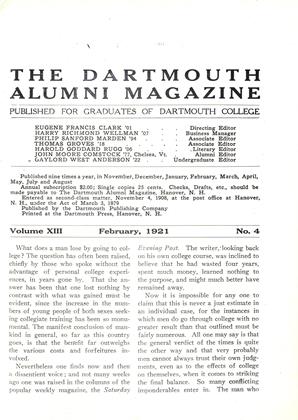A new edition of the Tuck School Announcement is now available for distribution in revised form.
The purpose of the school to maintain its established standards is indicated by the revised statement of requirements for admission and courses recommended. A general average of scholarship grades of not less than 2.2 in undergraduate courses is given chief place among entrance requirements. In the application of this requirement, it is noted that if the record of an applicant for admission shows that the required general average has been attained as the result of high grades in freshman and sophomore years and and that the grades in junior year have fallen below the required average, admission may be denied.' On the other hand, if the applicant's general average falls only slightly short of meeting the requirement, and if his grades in sophomore and junior years are consistently above the required minimum, he may be admitted on trial. Hereafter, no provision will be made for admission by examination.
As to prerequisite courses, the announcement is more specific than in previous editions. For the 12 hours in economics required, Economics 1, 2, 13 and 14, or their equivalent, are indicated.
After this year, the requirement in English will call for six hours in addition to the elementary courses in freshman year, and to meet this requirement courses in writing and in argumentation are recommended. Proficiency in the use of English will henceforth be emphasized as one of the requirements for admission.
The requirement in a foreign language has been reduced from twelve hours to six hours in college courses of at least third-year grade. But six hours of Spanish or Russian in college courses of first-year grade will be accepted from men who plan to continue one of these languages in the Tuck School and who have met the requirement in French or German.
A change in admission of special students has been made The special one-year course heretofore offered has been withdrawn. Special students may still be admitted, but will not have the same freedom of election permitted in previous years.
Provision is made to meet the needs of Tuck School men who desire to pursue advanced studies in science or other subjects as a part of their training for special fields of business which they plan to enter. In exceptional cases, for example, if a student desires to take an advanced course in another department, such as Chemistry, Mathematics, Engineering, etc., and if the course is shown to be essential as. preparation for the business which he plans to enter, he may be permitted to substitute that course for one of the courses otherwise required of Tuck School students.
The new course in Business Engineering to be given second-year Tuck School men by members of the Thayer School faculty is not described in the announcement. This course will be described in a later edition of the announcement.
The announcement contains a new statement of the regulations governing Tuck School students. First-year men, who are enrolled as seniors in the College, may participate in athletics or other undergraduate activities, provided such. Activities are not allowed to interfere with their work in the School. Hereafter, however, men who expect to engage in such activities must file a written statement at the beginning of each semester, indicating the nature of the activities and the time they are estimated to require. Students admitted on trial may not engage in activities without permission of the Tuck School Faculty.
The regulations governing attendance and accountability for absences are continued without change.
The changes in the announcement are explained in the following statement by Dean Gray:
"The most important thing which we hope future Tuck School men will gain from the revised announcement is a better perspective of their undergraduate work in its relation to their training for business. It is pretty well established in the minds of broad-guage business men that first-class work in the liberal college course has fully as great, if not greater, value in preparation for business life as any course in business administration can possibly have. As the announcement suggests, we are interested more in the breadth and quality of preparatory work than in the specific subjects studied. For this reason, the Tuck School insists that the undergraduate work required for admission shall have been completed with at least respectable grades. It is our purpose, furthermore, to encourage undergraduates to view their college work as a most important part of their preparation for business life as well as for the affairs of citizenship. To this end, we hope that an increasing number of undergraduates will be helped to see the advantages of completing the full academic course of four years before entering upon their professional training in business administration."
 View Full Issue
View Full Issue
More From This Issue
-
 Article
ArticleWhat does a man lose by going to college ?
February 1921 -
 Article
ArticlePEN AND CAMERA SKETCHES OF HANOVER AND THE COLLEGE BEFORE THE CENTENNIAL
February 1921 By EDWIN J. BARTLETT, '72 -
 Sports
SportsBASKETBALL
February 1921 -
 Article
ArticleTHE LOG OF THE DARTMOUTH OUTING CLUB
February 1921 By LELAND GRIGGS '02 -
 Sports
SportsHOCKEY
February 1921 -
 Article
ArticleA DARTMOUTH PIONEER
February 1921
Article
-
 Article
ArticleREGISTRATION FOR VARSITY SPORTS
March, 1914 -
 Article
ArticleA Building for Researck,Teaching, and Hanging Out
OCTOBER 1991 -
 Article
ArticleDartmouth Rallies to Top Tiger, Gains Tie for Ivy Gridiron Title
JANUARY 1964 By D. E. O. -
 Article
ArticleMedical School
November 1961 By HARRY W. SAVAGE M' 27 -
 Article
ArticleNot So Long Ago
October 1934 By R. M. Pearson '20 -
 Article
ArticleSki-Joring
MARCH 1932 By W. H. Ferry '32


